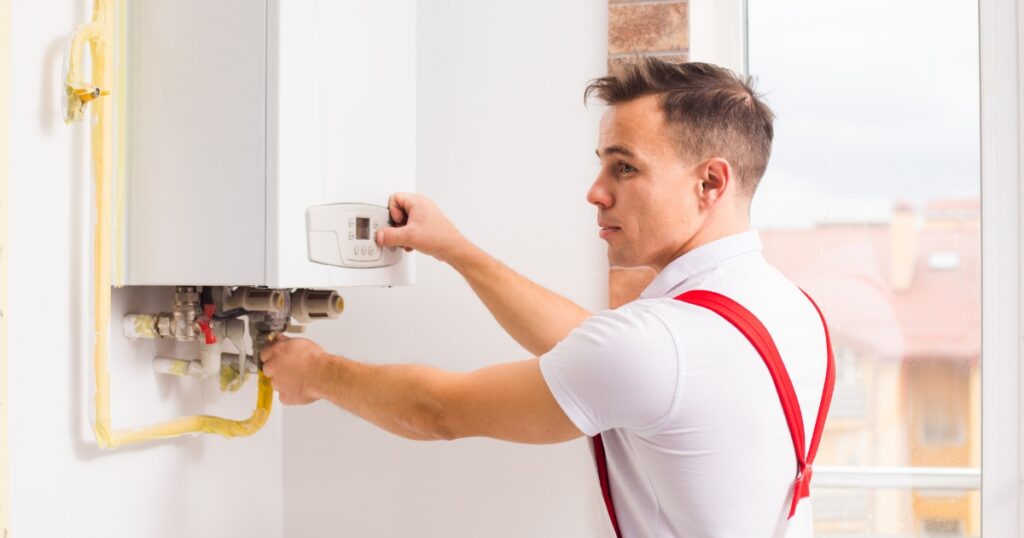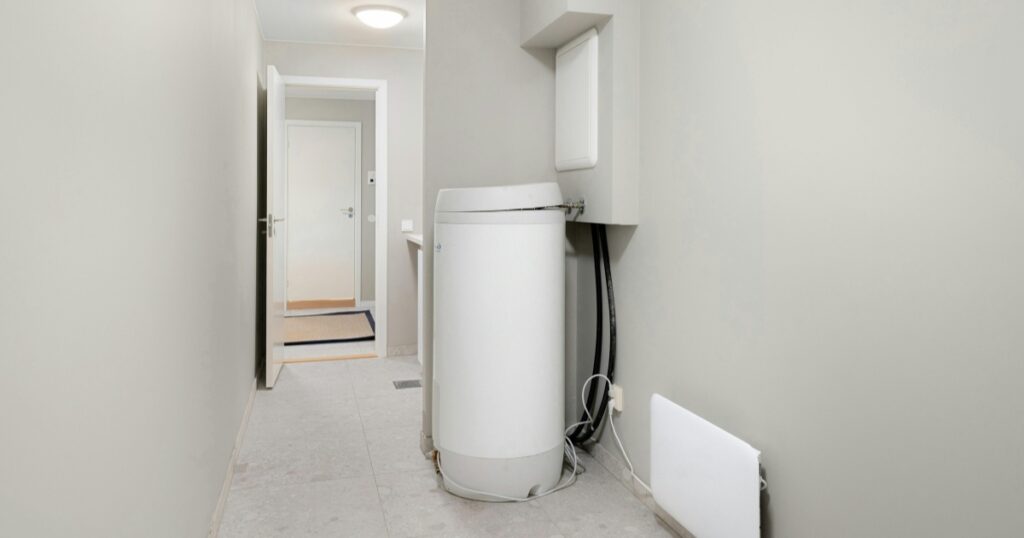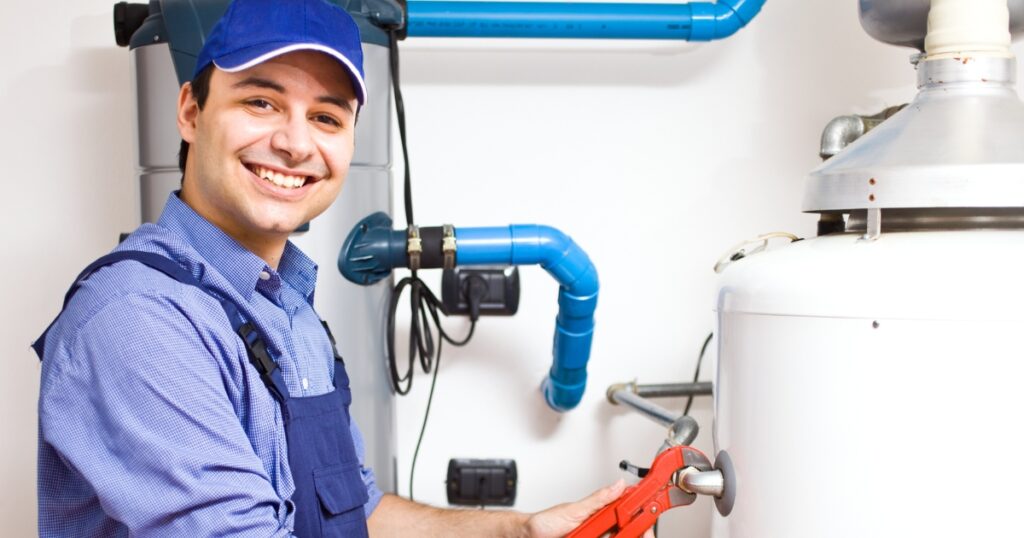Ending up with a chilly splash when you were hankering for a nice warm shower is more common than a kangaroo at sunrise. Plenty of us Aussies have been through the drill and know firsthand how it can throw a spanner in your day; reckon those pesky heating element troubles are right up there as one of the main culprits for turning hot water into a cold shocker.
Our blog’s here to guide you through spotting and fixing these electric hot water system headaches like a pro. So, grab yourself a cuppa, settle in, and let’s get that water from frosty to toasty again!
Key Takeaways
- Electric hot water systems can fail due to faulty heating elements, tripped circuit breakers, or thermostat issues. Regular checks can prevent a cold shower surprise.
- Sediment build-up and corrosion in the tank are common problems that reduce water heater efficiency. Flushing the system regularly helps keep it clear and functioning well.
- Safety is key with hot water systems; if you’re unsure about electrical connections or repairs, it’s smarter to call in a professional electrician rather than risk DIY fixes.
- The age of your hot water system affects its reliability; older systems are more likely to have issues such as sediment accumulation and component wear that need attention.
- For complex electrical problems like leaks or insufficient heating, getting help from experienced professionals ensures repairs are done safely and correctly.
Common Problems with Electric Hot Water Systems
Loss of hot water, no response from the water heater, insufficient hot water, discoloured or smelly water, and a leaking hot water system are some common issues that homeowners face with electric hot water systems.

These problems can be frustrating, but understanding the possible reasons for these failures can help troubleshoot and resolve them effectively.
Loss of hot water
We all dread stepping into a shower only to be met with icy water because our hot water service has decided to take the day off. This sudden loss of hot water is often due to heating elements that have called it quits or maybe a sneaky leak that’s letting water escape before it gets to you.
These are some common electrical issues in hot water services, and they can strike when least expected.
If your home suddenly goes without hot water, it could also mean there’s trouble with the temperature settings—they might be set too low—or there might be a problem with the thermostat itself.
And let’s not forget about those pesky circuit breakers that sometimes trip, cutting off power to your system without warning. Quick checks on these areas can give us clues as we troubleshoot electric hot water system faults together before calling in the professionals for backup.
No response from the water heater
When the water heater shows no response, it could be due to various electrical issues such as a tripped circuit breaker, a faulty thermostat, or a malfunctioning heating element. Checking the circuit breaker and ensuring that it hasn’t tripped is the first step.
If all seems well there, then examining the thermostat and heating elements for damage or faults is necessary. It’s important to remember that attempting repairs without adequate knowledge and experience can be risky – seeking professional help may be crucial if troubleshooting does not resolve the issue.
Regular maintenance and prompt attention to electrical issues are key to ensuring a consistent hot water supply without any disruptions. If you notice no response from your water heater, addressing the problem promptly will help avoid inconvenience and discomfort while maintaining efficient hot water services in your home.
Insufficient hot water
If you’ve been dealing with a lack of hot water, it could be due to several reasons such as damaged or faulty heating elements, thermostat issues, or sediment build-up in the tank.
In some cases, adjusting the temperature setting may also help alleviate the problem. It’s important to address insufficient hot water promptly to avoid discomfort and inconvenience.
Regular maintenance and inspection can help identify and resolve electrical issues before they result in more significant problems.
When addressing insufficient hot water, homeowners should consider factors such as damaged heating elements, thermostat issues, sediment build-up in the tank, and proper temperature settings.
Discolored or smelly water
If you notice discoloured or smelly water coming from your hot water tap, it could be due to sediment build-up or corrosion in the tank. These issues can cause the water to appear cloudy, brown, or have a metallic odour.
A buildup of sediment in the tank can also affect the heating element’s efficiency, leading to inadequate heat and potential system failure.
Addressing discoloured or smelly water promptly is crucial to prevent further damage to your electric hot water system. Contact a professional plumber or electrician who specialises in hot water services to inspect and address the underlying issue.
Leaking hot water system
Leaking in a hot water system can lead to significant damage if left unaddressed. A common cause of leaks is corrosion within the tank, which may occur over time. Additionally, high water pressure or a faulty temperature and pressure relief valve could also result in leaks.
It’s essential to promptly address any signs of leakage to avoid further damage and potential safety hazards.
Regular maintenance and inspection are crucial for identifying potential sources of leaks early on, ensuring that the hot water system remains in good working condition. If you notice any signs of leaking, it is advisable to seek professional assistance immediately to prevent further damage or disruption to your hot water supply.
Possible Reasons for Electrical Water Heating System Failure
Power issues, sediment build-up, corrosion in the tank, heating element failure, and the age of the system can all contribute to electrical water heating system failure. It’s important to understand these potential reasons in order to troubleshoot and address any issues with your hot water service.
Power issues
If your electric hot water system is not functioning properly, power issues could be to blame. It’s essential to check for tripped circuit breakers or blown fuses, as they can disrupt the flow of electricity and cause the water heater to stop working.
Additionally, damaged or loose electrical connections can also lead to power problems in the hot water system, affecting its heating capabilities. Regularly inspecting and maintaining the electrical components of your hot water service can help identify power issues early on and prevent inconvenience due to a lack of hot water.
Corrosion in the tank can also contribute to power-related problems in electric hot water systems. Over time, sediment build-up and corrosion on heating elements may impair their function, leading to inadequate heating capacity or total failure of the unit.
Sediment build-up
Sediment build-up in your hot water system is a common issue that can lead to reduced efficiency and potential damage. Over time, mineral deposits can accumulate at the bottom of the tank, affecting the heating element’s ability to function optimally.
This build-up also has the potential to cause corrosion and reduce the overall lifespan of your hot water system. Regular maintenance and flushing of your hot water tank can help prevent sediment from causing significant issues.
If not addressed promptly, sediment build-up could result in decreased heating performance, increased energy consumption, and even premature failure of the system. To avoid these problems, consider scheduling routine inspections with a professional technician or plumber who can flush out any accumulated sediments and ensure your hot water system continues to operate efficiently.
Corrosion in tank
Corrosion in the hot water tank can lead to significant issues with your system, affecting its performance and lifespan. Corrosion occurs when the metal of the tank deteriorates due to exposure to water and other elements over time.
This can cause leaks, reduced heating efficiency, and even complete failure of the tank. Regular maintenance and inspections are crucial for identifying corrosion early on, as prompt repair or replacement may be necessary to prevent more extensive damage.
Over time, any electrical components within the hot water system can also be affected by corrosion in the tank. It’s essential to address this issue promptly as it could lead to larger problems such as heating element failure or electrical faults within the system.
Heating element failure
Heating element failure in hot water systems can lead to a sudden loss of hot water or insufficient heating. If your system is not delivering enough hot water, it could be due to one or more failed heating elements.
It’s essential to have these elements inspected and replaced by a qualified professional to ensure the optimal performance of your hot water system.
If you suspect a heating element failure, it is crucial to seek prompt professional assistance and avoid attempting repairs on your own. Ignoring this issue may result in further damage or complete malfunction of your hot water service, causing inconvenience and discomfort for you and your family.
Age of system
The age of your hot water system can significantly impact its performance and reliability. As systems get older, they are more prone to issues such as corrosion, sediment build-up, and wear and tear on heating elements and thermostats.
As a result, the efficiency of the system can decrease over time, leading to problems with inadequate hot water or even complete failure.
Regular maintenance checks by a qualified professional can help identify any potential issues related to the age of the system before they escalate into major problems. It is essential for homeowners to keep track of the age of their hot water system and consider replacement if it is approaching or has exceeded its expected lifespan to ensure continuous access to hot water without unexpected disruptions.

Troubleshooting Hot Water System Not Working
If you’re experiencing issues with your hot water system not working, there are a few troubleshooting steps you can take before calling in a professional. Checking the warranty on your system, examining electrical connections, and testing the heating elements and thermostat are good places to start.
Check the warranty on the system
Inspect the warranty of your system for coverage of potential electrical issues. Look into the terms and conditions to see if the problems you are encountering are included in the warranty provisions.
If covered, contact a professional promptly to address the issue.
Inquire with your system’s manufacturer or installer about any available warranties and their duration as soon as you notice an electrical problem. This can save on repair costs if it’s a covered issue.
Examine electrical connections
Inspect the electrical connections in your hot water system for signs of wear or corrosion. It’s important to check for loose, frayed, or damaged wires that may be affecting the functionality of your unit.
Look out for any burnt or discoloured areas around the connections as these could indicate overheating and potential safety hazards. If you notice any issues with the electrical connections, contact a qualified electrician to address the problem promptly.
Understanding how to examine and maintain your hot water system’s electrical connections is crucial for ensuring its safe and efficient operation. Regular inspection can help identify potential problems before they escalate into major faults, contributing to a prolonged lifespan and reliable performance of your hot water service.
Test heating elements and thermostat
After examining the electrical connections, it’s important to conduct tests on the heating elements and thermostat of your hot water system. First, ensure that all power to the unit is turned off.
Once confirmed, carefully remove the access panels on your water heater and use a multimeter to test the continuity of each heating element. If any readings indicate an open circuit, then it’s likely that they need replacing.
Similarly, you can also test for resistance and continuity in your thermostat using a multimeter, identifying any irregularities in temperature control or functionality.
Regular testing of these components is crucial as faulty heating elements and malfunctioning thermostats are common causes of hot water system issues like insufficient heat or no hot water at all.
When to Seek Professional Help for Hot Water Services
If you’re dealing with complex repairs or replacements, safety concerns, or if you lack knowledge and experience in handling electrical issues, it’s best to seek professional help.
A licensed electrician can accurately diagnose and fix the problem with your hot water system.
Complex repairs or replacements
When facing complex repairs or replacements for your hot water system, it is essential to seek professional help. In some cases, the issues with your electrical hot water service may require advanced technical expertise and specialised equipment that only qualified electricians or plumbers can provide.
These professionals have the knowledge and experience to handle intricate repairs involving heating elements, thermostat malfunctions, circuit breaker issues, or complete system replacements when necessary.
Seeking their assistance ensures that complex electrical problems are addressed effectively and safely, providing you with a reliable and efficient hot water service in the long run.
If you’re experiencing any of these problems mentioned earlier – such as loss of hot water, an insufficient supply of hot water, or unusual discolouration or odour from your faucet – it’s best to consult a professional sooner rather than later.
Safety concerns
Safety concerns regarding electrical hot water systems are critical for homeowners to address promptly. Faulty heating elements, damaged wiring, and malfunctioning thermostats can pose fire hazards and electrical shocks.
It is essential to prioritise safety by avoiding DIY repairs and seeking professional help when experiencing complex electrical issues with hot water systems. Additionally, regular maintenance and inspection by qualified electricians can help identify potential safety risks early on, ensuring the safe operation of the entire system.
Ensuring that all electrical components are properly installed, maintained, and repaired as needed is crucial in minimising safety risks associated with hot water services. Inadequate knowledge or experience in handling electrical components can lead to serious safety hazards; therefore, it’s important to rely on licensed professionals for any necessary repairs or replacements of the electric hot water system.
Inadequate knowledge or experience
If you lack in-depth knowledge or experience when it comes to troubleshooting electrical issues in hot water systems, seeking professional help is crucial. Attempting complex repairs without the necessary expertise can lead to safety hazards and further damage to the system.
Addressing electrical problems with hot water services should be left to qualified electricians who possess the specialised skills required for such tasks.
Always consult a licensed professional if you are unsure about how to address electrical issues in your hot water system. It’s important not to underestimate the complexity of these systems, as attempting DIY repairs without sufficient knowledge can lead to more extensive and costly problems down the line.
Get to Know the Common Electrical Issues
In summary, addressing electrical issues promptly is crucial for maintaining a reliable hot water service. Regular maintenance and inspection can help identify problems early on. Seeking professional help for complex repairs or safety concerns is important to ensure the efficient functioning of your hot water system.
Don’t overlook the significance of regular maintenance and prompt repairs in ensuring uninterrupted access to hot water.






